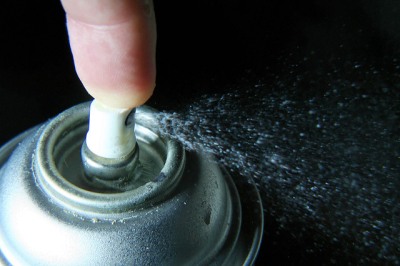later post | index | earlier post
How To Dispose of Aerosol Cans in the UK
Thursday, 13 October 2022

Each year it’s estimated that the UK uses around 600 million aerosol cans, amounting to more than ten cans per person. Most aerosol cans (60%) are made using tin-plated steel, while the remaining 40% use high-grade aluminium, making them a highly recyclable product.
Despite their recyclable properties, many people are still unsure about how to safely dispose of them, as the combination of gases and metal means they can occasionally be dangerous if they are incorrectly depressurised.
What types of cans are aerosols?
Any can which is designed to spray its content, is defined as an aerosol. Common examples include:
- Hairspray
- Spray paint
- Deodorant
- Room deodorisers
How can you recycle aerosol cans in the UK?
Aerosol cans are widely recycled in household collection schemes and at recycling points but following these top tips can help make the process safer and run more smoothly.
- Ensure that cans are empty before they are put into banks or kerbside collections.
- Don’t pierce or attempt to flatten the cans before throwing them into the recycling.
- Parts that are loose or removable, like the lid, should be detached and disposed of separately in the appropriate recycling bin.
- Mix cans with other forms of recycling, as this helps to dilute the proportion of aerosols within the overall balance of a collection.
The British Aerosol Manufacturers Association (BAMA) provides full guidance on the collection and processing of both empty and full cans.
What bin do aerosols go to in the UK?
Providing your can is empty, it can be recycled along with your tins in your mixed recycling bin at home. You don’t need to remove the labels from an aerosol, as these are taken care of during the recycling process, however the lid does need to be detached before the can goes in the bin.
How do you dispose of aerosol cans that aren’t empty?
If the aerosols are either full or partly full, they need to be treated as hazardous waste and disposed of safely at a specialist recycling facility. If you do have a partially full can, you can take it to your local household waste facility. Alternatively, some large retailers also have facilities that collect aerosols which are still full.
Get in touch today
If you want to learn more, speak to ASM Metal Recycling. Our blog has a wide variety of guides and advice around scrap metal, including aluminium and lead recycling, and why it’s better to recycle copper.
later post | index | earlier post
Recent posts
- What to do with radioactive scrap metal
- How does metal recycling benefit the economy and the environment?
- 5 common metals that can be recycled
- How does metal recycling work?
- How to Sort Metal for Scrap
- How to classify the different types of waste your business produces
- What is WEEE waste?
- Can iron be recycled in the UK?
- What has the most copper in it to scrap?
- How to better understand scrap metal pricing
- Is there a link between copper and brass prices?
- How to make money from cable scrap
- How many different types of copper are there?
- What can I sell to a scrap metal yard?
- Preparing for the collection of scrap metal